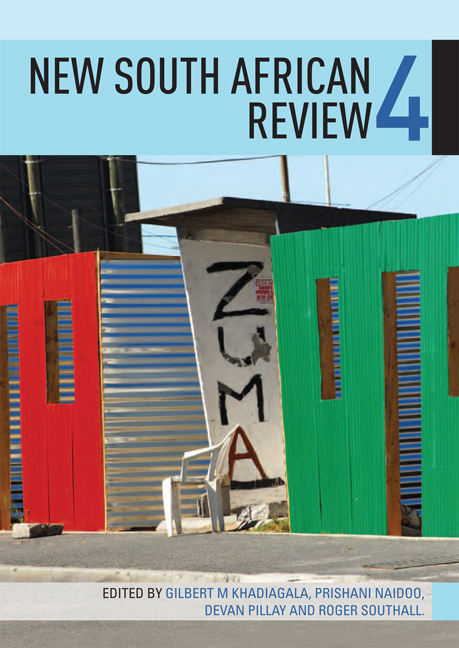Book contents
- Frontmatter
- Contents
- Preface
- Introduction: South Africa's fragile democracy: Twenty years on
- PART ONE ECOLOGY, ECONOMY AND LABOUR
- PART TWO POWER, POLITICS AND PARTICIPATION
- PART THREE PUBLIC POLICY AND SOCIAL PRACTICE
- PART FOUR SOUTH AFRICA AT LARGE
- Introduction
- Chapter 15 South Africa in Africa: Groping for leadership and muddling through
- Chapter 16 South Africa and Israel: From alliance to enstrangement
- Chapter 17 South Africa's economic ties with north-east Asia
- Chapter 18 Regional parastatals within South Africa's system of accumulation
- Chapter 19 The leadership challenge in Southern Africa
- Contributors
- Index
Chapter 19 - The leadership challenge in Southern Africa
from PART FOUR - SOUTH AFRICA AT LARGE
Published online by Cambridge University Press: 21 April 2018
- Frontmatter
- Contents
- Preface
- Introduction: South Africa's fragile democracy: Twenty years on
- PART ONE ECOLOGY, ECONOMY AND LABOUR
- PART TWO POWER, POLITICS AND PARTICIPATION
- PART THREE PUBLIC POLICY AND SOCIAL PRACTICE
- PART FOUR SOUTH AFRICA AT LARGE
- Introduction
- Chapter 15 South Africa in Africa: Groping for leadership and muddling through
- Chapter 16 South Africa and Israel: From alliance to enstrangement
- Chapter 17 South Africa's economic ties with north-east Asia
- Chapter 18 Regional parastatals within South Africa's system of accumulation
- Chapter 19 The leadership challenge in Southern Africa
- Contributors
- Index
Summary
INTRODUCTION
The history of Southern Africa has been one of cooperation and conflict. The late 1940s saw the rapid cooling of relations as apartheid became the official policy of the Republic of South Africa, and from 1948 the apartheid system became the paramount factor around which sub-regional relations evolved. As successive National Party governments worked tirelessly to defend apartheid, the neighbours endeavoured to defeat the hated and unjust system. However, given South Africa's economic and military domination of the region and the history of deep interdependence, South Africa's relations with its neighbours – while tense and hostile – remained remarkably close, and although efforts to isolate South Africa politically and culturally were relatively successful they were not matched by similar successes at the economic level. South Africa's relations with its neighbours have paradoxically been characterised by moments of tension, even intermittent wars, and by relative stability and cooperation.
With the demise of apartheid in the early 1990s, many anticipated a thawing in subregional relations with peaceful coexistence and cooperation for mutual gains replacing old tensions. The new South Africa, led by a popular democratically elected government, was expected to use its proven capabilities and its democratic credentials to play a pivotal leadership role on the African continent in general and the Southern African region in particular. It is against this backdrop that South Africa's relations with the newly revamped SADC came into sharp focus. Analysts and scholars expected South Africa's membership to the regional body to bring about qualitative difference and to substantially strengthen the organisation (Biswas 2004: 8). President Robert Mugabe of Zimbabwe vividly captured this sentiment and hope in 1994, when he said: ‘Given its level and size of economic development, South Africa will have a positive and major role to play in enhancing the efficacy of SADC as a regional organisation’ (Conradie 2001: 47).
South Africa was perceived as a ‘natural leader’ in Southern Africa (King 1994:8). And with its economic and financial resources, its democratic dispensation and substantial military capabilities, South Africa was considered an unchallenged political, economic and strategic heavyweight in Southern Africa. Its accession to the SADC Windhoek Treaty of 1992 was generally perceived as something of a ‘shot in the arm’ for the sub-regional organisation, which would give it an edge in enhancing performance and driving progress (Seymour 1996:1).
- Type
- Chapter
- Information
- New South African Review , pp. 349 - 363Publisher: Wits University PressPrint publication year: 2014



